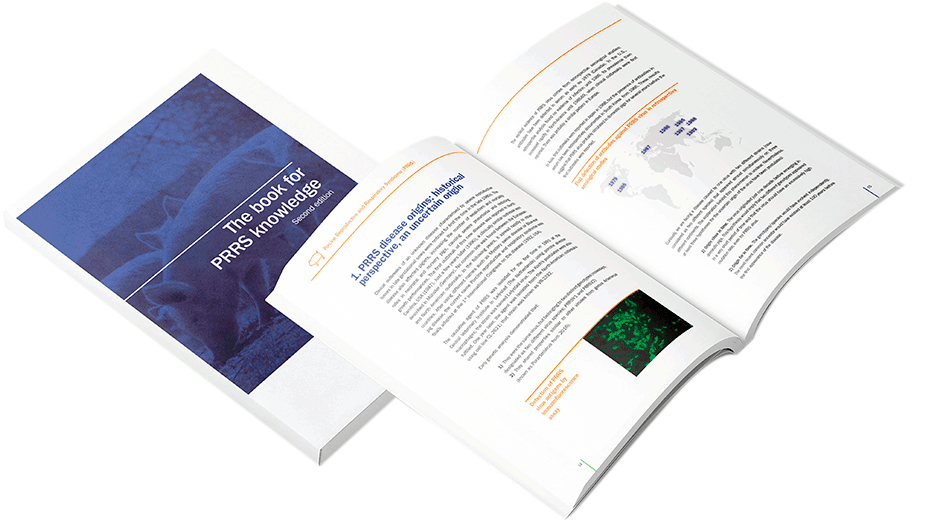1
Diagnosis
As the severity of PRRS virus infection vary widely, from the lack of clinical signs to devastating outbreaks, a PRRS diagnosis based solely on a clinical suspicion can be extremely complicated or lead us to error.
2
Laboratory diagnosis
Diagnostic tests are absolutely necessary to confirm PRRS. Obviously, a successful, accurate and representative diagnosis largely depends on the quality and suitability of the samples. As stated in section “Physical and chemical characteristics of PRRS virus”, this virus is relatively labile; samples should be kept under refrigeration conditions (4 ºC) and sent to the diagnostic laboratory swiftly (best within 24 h).
3
Alternative sampling and conservation methods
In some countries, oral fluid became a widely used sample to detect of PRRS virus genome by RT-PCR and antibodies by ELISA. There are commercial kits and in-house assays for both techniques. Nonetheless, it is important to remark that due to physical characteristics of oral fluid the RT-PCR and the ELISA kits used for serum analysis cannot be directly applied to this type of sample; the assays must be adapted.
4
Pathological evaluation
Gross lesions of interstitial pneumonia and enlarged lymph nodes due to PRRS infection may be observed. However, these lesions can be also observed during other infections. As previously mentioned, there are no pathognomonic gross lesions in lungs from pigs suffering PRRS respiratory outbreaks, neither in sows or aborted fetuses from PRRS reproductive failures.
5
Detection of virus
Identification of PRRS virus can be accomplished by the detection of viral proteins (antigen), by virus isolation and by the detection of nucleic acids. Immunohistochemistry (IHC) and in-situ hybridization (ISH). PRRS virus antigen or nucleic acid can be detected in tissues by IHC and ISH, respectively. The relationship between viral detection and lesions can be established by a combination of IHC or ISH and histopathology.
6
Sequencing
DNA obtained during the RT-PCR assay can be sequenced to obtain the order of nucleotides in the genome. DNA sequencing is useful to discriminate between individual strains. Usually, the relatedness among different isolates is done based on the comparison of ORF5, ORF6 or ORF7 sequences.
7
Detection of antibodies
Enzyme-Linked ImmunoSorbent Assay (ELISA). Detection of serum or oral fluid antibodies. It is easy, rapid and cheaper compared to other assays. At present, there are many commercially available ELISA kits for detection of PRRS virus-specific antibodies; some of them have the ability to identify antibodies against both PRRSV1 and PRRSV2; others can distinguish the species. Recently, some ELISAs have been also adapted to testing oral fluid samples.
8
Practical approach to diagnosis
Laboratory confirmation in a reproductive failure. Sows usually abort from 3 to 21 days after the infection. Therefore, diagnostic after 21 days gets more complicated. In some circumstances, serum from sows should not be considered as one of the first choices to diagnose reproductive failure due to PRRS virus:
9
Monitoring
Management, biosecurity, monitoring and vaccination are the pillars on which a PRRS control plan must be based. Monitoring, based on detection of the virus by RT-PCR and antibodies by ELISA, are essential to: • Detect early problems associated with PRRS. Classify the farm by the PRRS virus status.



